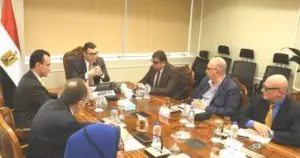Engineer Sherif El-Shorbagy, the Minister of Housing, Utilities, and Urban Communities, held a meeting last night to review the progress of the projects aimed at reviving Cairo’s Khedivial District and to discuss a series of proposals concerning pedestrian pathway plans in downtown Cairo. The meeting was attended by officials from the Ministry, the New Urban Communities Authority, as well as representatives from the Arab Contractors Company and the project consultant.

The Minister of Housing opened the meeting by emphasizing the government’s clear vision to optimize the use of the Khedivial District in line with current efforts to restore it. He highlighted the importance of preserving the architectural character of this area, which is distinguished by its architectural and artistic beauty. He also stressed the need to preserve the architectural heritage of the buildings and integrate them into the tourism map to maximize their benefits, in alignment with the national plan to showcase Cairo’s historical landmarks and restore their historical significance.
The meeting discussed the proposed elements for developing pedestrian pathways in downtown Cairo, including preparing them for pedestrians and incorporating landscape elements such as street lighting, greenery, pavements, and more. Additionally, the status of the remaining works in the development and restoration of the historic Azbakeya Garden was reviewed. This project is part of the efforts to restore the heritage components of the garden, including preserving historical trees, the hill area, and renovating both the pergola at the peak of the hill and the historic fountain, as well as the Souq Al-Salah Club.
Furthermore, the status of the development and restoration of the Opera Garage building was addressed, with a focus on preserving the unique architectural style of downtown Cairo.
At the conclusion of the meeting, Engineer Sherif El-Shorbagy directed the acceleration of timelines and the creation of an executive program for all remaining works, emphasizing the importance of regular follow-ups on these projects and coordination with the relevant authorities to complete them as soon as possible.
